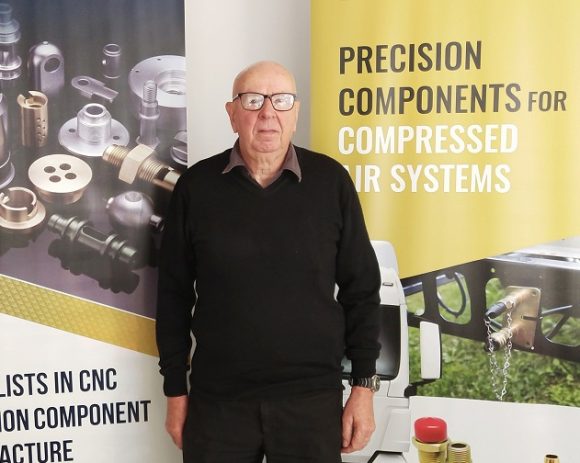Our podcast team is taking a short break to enjoy Labor Day weekend with our families. In the meantime, in keeping with the international theme of Season 4, we hope you will listen again to the podcast we did with Graeme Sinclair, owner of Parish Engineering, a machine shop in Melbourne, Australia.
Scroll down to listen to the podcast.
On today’s podcast we interviewed Graeme Sinclair, owner of Parish Engineering, a prominent precision machining shop in Australia. Graeme has been in the machining business for 60 years, since he served his apprenticeship at age 14.
In the interview, Graeme discussed the challenges faced by machine shops in Australia verses the rest of the world, his eclectic taste in CNC machines, and his passion for the game of squash. Sinclair explains that one reason he has many different types of equipment is that automotive companies have shut down their operations in Australia, meaning a lot of high volume work has disappeared.
Scroll down to listen to the podcast. Or listen on your phone with Google Podcasts, Apple Podcasts,or your favorite app.
Main Points
Graeme talks about being a long-time fan of Today’s Machining World. He used to receive the printed copy of the magazine before it went digital and enjoyed sharing the printed articles around the shop. He talks about Lloyd offering him screw machines in the past. (2:40)
Graeme speaks about Parish Engineering, which was created by Mr. Parish in 1932. Parish ran turret lathes and single spindle cam screw machines such as INDEX B60s. In 1968, with no one to take over the company, Parish sold the company but remained to train others. Graeme joined the company in 1972 but was laid off in 1975. In 1980, Graeme returned and bought the company with his brother-in-law. His business partner retired in 2010, leaving Graeme and his daughter as the current owners. (4:30)
Graeme describes the company as a screw machine job shop with 28 CNC lathes and several vertical machining centers. The company owns Citizen, Star, Mori Seiki, Tsugami, Nakamura Tome, and INDEX machines. Graeme says he prefers Citizens for Swiss work. (6:00)
Graeme says the company made parts primarily for the automotive industry when he assumed leadership in the 1980s. It still does some automotive parts, specifically for the Ford Ranger, because the gear shift is made in Australia. Forty percent of the company’s current business is making pneumatic couplings and air fittings for track braking systems. The remainder of the company’s business comes from contract jobs. He says he is pretty sure the Ford Ranger is assembled in South America, South Africa and Thailand. (7:00)
Graeme talks about growing up in Melbourne, Australia, and how he got into the machining business. At 14, he left school because his parents were very poor and began an apprenticeship in fitting and turning. For 10 years, he went to night school three nights a week to get a degree in engineering. Both of his daughters are also mechanical engineers; one is the CEO of Parish Engineering and the other works in New York. Graeme is 74 and has been in the business for 60 years. He says he is finally down to working just five and a half days a week. He says he starts work at 8AM or earlier. (9:00)
Graeme says he didn’t plan to get into the machining business, but got into fitting and turning because it seemed like a good opportunity for someone with little formal schooling. He also worked in the machining business in England for a short time. (10:40)
Graeme talks about the differences between screw machine shops in the US and Australia. He has visited shops in the US and England, and says it seems like they all are facing the same challenges. The main difference he says is the US not using the Metric system. (12:20)
Graeme says about 20% of the parts produced by Parish Engineering is exported. (13:10)
Graeme says he still has use for multi-spindle screw machines. Three years ago, he acquired a second machining business, which he has been growing. He is thinking about adding another multi-spindle to handle high volumes. CNC work is diminishing slightly because of Australia’s declining auto industry. He says Australia doesn’t support manufacturing as well as other countries. He says manufacturing is strong but not as strong as it used to be.(13:40)
Graeme talks about the skills gap and how there are fewer jobs in the machining industry, as well as fewer skilled workers to fill them. He says many of his employees are immigrants because Australians are not as interested in working in manufacturing. He says Australians believe strongly in getting a college education, but many graduates struggle to find jobs in their fields of study. (14:10)
Graeme explains that immigration to Australia is not difficult for skilled workers from more developed countries. He says Australia is very culturally diverse and that the number of nationalities in Melbourne is close to 200. (17:20)
Graeme describes the differences between Sydney and Melbourne. He says Sydney is larger and closer to the mining industry, but Melbourne is the metal working manufacturing hub of the nation. Graeme says Sydney is similar to New York while Melbourne is Australia’s fashion capital and sports mecca. (18:40)
Graeme talks about playing squash, a sport that he has enjoyed for 57 years. He is the captain of his team and says he can still beat players 26 years younger than he is. He says the difference between racquetball and squash is the size of the ball and rackets. Both sports are played on the same court, but he says squash is faster and more challenging. He says when he was growing up, everyone played tennis. (21:20)
Graeme discusses the relationship between Australia and China. He says China is one of Australia’s closest large countries and its biggest trading partner. It buys a lot of Australia’s wine and agricultural products. Graeme says doesn’t buy much tooling from China and sells only one part to a Chinese company on an infrequent basis. (25:00)
Graeme says many Southern Australians where he lives are not fans of President Trump. He says many people including him regard Trump as “unprofessional.” Graeme says his business has not felt much impact from American foreign policy. (26:20)
Graeme says his businesses are going well and they consistently make profit. He says Parish Engineering is the oldest machine shop of its kind in the Australia. He says it has about six competitors of the same caliber. He says his philosophy is not to relax when things are good, and not to worry when they are bad. (28:35)
Graeme describes himself as hands-on. He spends a lot of time problem solving and trouble shooting on the shop floor. While he doesn’t mind time in the office, he says being on the floor is the best way to utilize his 59 years of practical shop experience. (30:20)
Graeme says having his daughter as CEO gives the company more purpose, knowing that the business will continue into the future. (31:25)
Graeme discusses the additional Lico CNC machine that he is looking to purchase for his company. He likes that it is quick and flexible. (31:50)
Question: Would you like to move to Australia?
Podcast: Play in new window | Download



